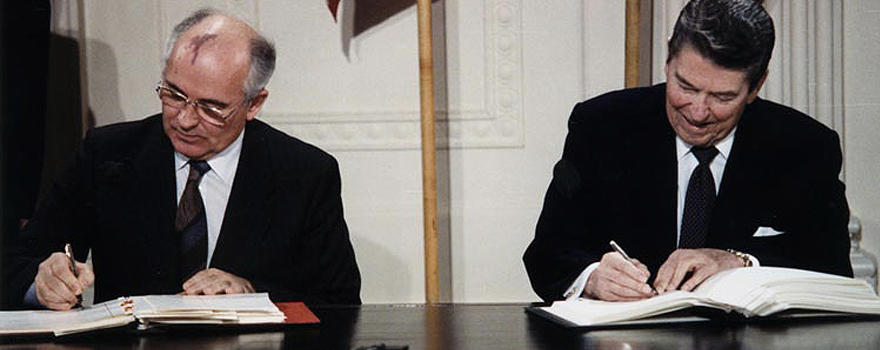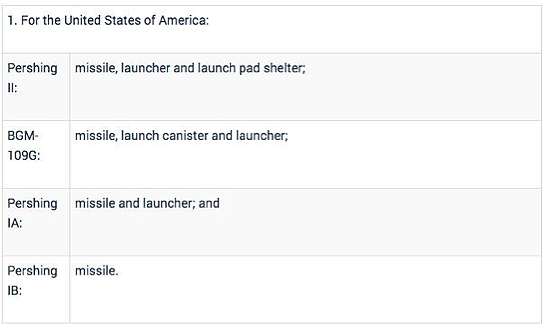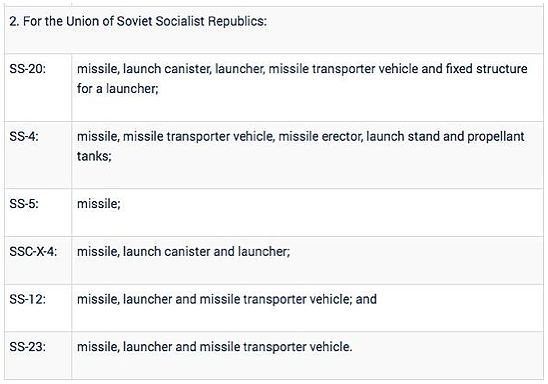Breadcrumb
Blogs
Entries with tag inf treaty .
The US will pull out of the treaty if Russia doesn't ‘return to full compliance’. Putin has taken the dispute to the UN
With all the conflicts and issues threatening worldwide security, the last thing the world needs is a new arms race, or what many are calling a new Cold War. European countries in particular are worried that US President Donald Trump pulling out of the INF Treaty might lead to exactly that. United States, supported by NATO, accuses Moscow of cheating on the missile treaty. At the beginning of December, the Trump administration gave 60 days to Russia to “return to full and veritable compliance”. President Vladimir Putin has taken the issue to the United Nations.

▲ Mikhail Gorbachev and Ronald Reagan at the signing of the INF Treaty, in 1987 [Reagan Presidential Library]
ARTICLE / Nicole Davalos
To understand what the Intermediate-Range Nuclear Forces Treaty is about and why the possible US withdrawal concerns most of the international community, we have first to understand why it was created and what its purpose is. The INF Treaty was signed in 1987 following the deployment by the Soviet Union of missile SS-20 in Europe, which was retaliated by American cruise missiles and their Pershing II missiles. The issue with intermediate-range missiles back then was that their flying time was as little as 10 minutes, which was seen as a possible trigger to nuclear war. Soviet leader Mikhail Gorbachev and US President Ronald Reagan signed the deal, prohibiting land-based cruise or ballistic missiles with ranges between 311 and 620 miles (500-1,000 kilometers, short-range) and between 620 and 3,420 miles (1,000-5,500 kilometers, intermediate-range).
It is important to note, however, that the treaty does not cover air or sea-launched weapons even though they can potentially fly the same distances. Russia’s 3M-54 Kalibr, a sea-launched missile, is an example. The following charts retrieved from the official website of the US Department of State outline the affected missiles specified under the elimination protocol of the treaty:
The INF Treaty has helped not only to solve the problems of its time towards the end of the Cold War but also serves still to this day as an umbrella of protection for US’s allies in Europe. The INF provides a measure of strategic stability on the European continent.
According to the Stockholm National Peace Institute, by 1991, 2,692 missiles had been eliminated thanks to the treaty; 846 owned by the US and 1,846 owned by the USSR. The treaty also allows both parties to inspect each other’s progress in eliminating the missiles to maintain transparency. So, if so much progress has been made as a result of the INF, then why is it that President Trump now insists on a US withdrawal?
President Trump has accused Russia of repeatedly violating the treaty. In fact, former President Obama first accused Russia of violations in 2014 during the Ukraine crisis, when Moscow allegedly deployed a prohibited missile. “I don’t know why President Obama didn’t negotiate or pull out” were the words of the current president, “…we’re not going to let them violate a nuclear agreement and go out and do weapons and we’re not allowed to… so we’re going to terminate the agreement. We’re going to pull out.” Recently, the NATO confirmed Russia’s violations. Jens Stoltenberg, NATO’s Secretary General, urged Russia to address these concerns in a “substantial and transparent manner.”
These accusations have truly created tensions between both parties of the treaty. Kremlin spokesman Dimitri Peskov has repeatedly denied the violations. He even went as far as claiming that it was, in fact, the US who first violated the treaty, with “armed US drones” that “fly within the ranges prohibited by the treaty”. As for the president, Vladimir Putin, he has replied with questionable threats such as “revenge is inevitable and they will be destroyed. And we, as victims of aggression, will go straight to heaven as martyrs while they will just croak.” In general, the Kremlin sees a US withdrawal as a confirmation of how “unreliable” a partner the United States is when it comes to other countries’ interests since it would be acting completely unilaterally and pulling out implies security concerns for many other countries, especially European countries.
Europe shows the most concern for the possible dissolution of the INF Treaty since it is believed that Russia’s intermediate range missiles would pose the biggest threat to them. Many analysts agree that this is a particularly bad time for the US to make a decision that would further raise tensions within Europe since security-related tensions such that of immigration exist in the region already. EU spokeswoman for foreign affairs and security policy Maja Kocijancic stated that the United States and Russia should definitely engage in dialogue and try to preserve the treaty, since “the world doesn’t need a new arms race.”
|
|
The most unexpected and interesting role in all of this, however, is China’s. It is no secret to anyone that what displeases President Trump the most about the INF Treaty is that China is not a signatory. If Russia is violating the treaty, and China, on the other hand, is not part of such an agreement that restricts its missile force, then the US seems to be at a disadvantage. “If Russia’s doing it and if China’s doing it and we’re adhering to the agreement, that’s unacceptable,” stated President Trump last October. In fact, according to Admiral Harry Harris, head of the US Pacific Command, if China were part of the INF Treaty right now, around 95% of its missile force would be violating it. When it comes to China’s reaction to the White House’s desire to withdraw, to “think twice” is what Beijing wishes Washington would do. Hua Chunying, a foreign ministry spokeswoman, said US withdrawal would lead to a “multitude of negative effects.”
What’s now left to be seen is whether President Trump will, in fact, pull out from the treaty. Presidents Putin and Trump both met in Paris in November, but although many different issues were discussed, a potential meeting to formally discuss the future of the INF Treaty was not part of the conversation. But if the US does withdraw, will that really mean a new Cold War? According to many analysts, an arms race like the one the world was experiencing back when the treaty was originally signed, might definitely become a reality. The Kremlin has also hinted several times at the possibility of a new arms race; the Russians would be “forced to develop weapons” to “restore balance in the sphere” if the US were to pull out.
For now, Secretary of State Mike Pompeo announced on December 4 that the US “will suspend its obligations as a remedy effective in 60 days unless Russia returns to full and veritable compliance”. Ten days later, Russia submitted a draft of resolution to the UN General Assembly in support of the INF Treaty calling on all sides to fulfill their obligations. It seems to be a move towards a bilateral negotiation, but 2019 will begin with uncertainty in a matter so critical as this.


